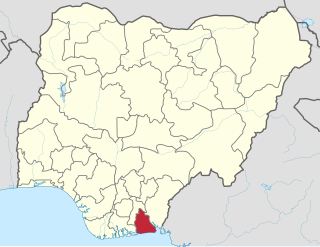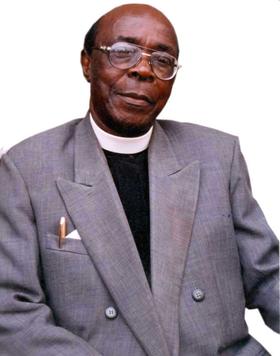
Akwa Ibom State is a state in the South-South geopolitical zone of Nigeria on the east by Cross River State, on the west by Rivers State and Abia State, and on the south by the Atlantic Ocean. The state takes its name from the Qua Iboe River which bisects the state before flowing into the Bight of Bonny. Akwa Ibom was split from Cross River State in 1987 with its capital Uyo and with 31 local government areas.

The Ibibio people are a coastal people in southern Nigeria. They are mostly found in Akwa Ibom, Cross River State and the Eastern part of Abia State. They are related to the Efik people. During the colonial period in Nigeria, the Ibibio Union asked for recognition by the British as a sovereign nation.
The Anaang are an ethnic group in southern Nigeria, whose land is primarily within 8 of the present 31 local government areas in Akwa Ibom State: Abak, Essien Udim, Etim Ekpo, Ika, Ikot Ekpene, Obot Akara, Oruk Anam, Ukanafun in Akwa Ibom State. The Anaang are the second largest ethnic group in Akwa Ibom state.
Uyo is the capital city of Akwa Ibom in South South Nigeria. Ibibio is the language spoken in Uyo.
Ikot Ekpene, also known as The Raffia City, is a historic town in south-southern state of Akwa Ibom. It is the political and cultural capital of the Annang ethnic group in Nigeria. The town is located on the A342 highway that parallels the coast, between Calabar to the south east and Aba to the west, with the state capital, Uyo, on this road just to the east. Umuahia is the next major town to the north.
Eket is one of the 31 local government areas in Akwa Ibom State, Nigeria. The name Eket or Ekid also refers to the indigenous ethnic group of the region and to their language. The Eket people use the endonym Ekid for themselves and their language, but Europeans spell and pronounce the name as "Eket".

The Oron people are a multi-ethnic tribal grouping that make up the Akpakip Oro or Oron Nation. The Oron are located primarily in southern Nigeria in the riverine area of Akwa Ibom and the Cross River States and in Cameroon. Akpakip Oro are regarded as an ancient warrior people, speaking the Oron language which is in the Cross River language family of the Benue–Congo languages. They are ancestrally related to the Efik people of the Cross River State, the Ibeno and Eastern Obolo( ie Adoni East) in Akwa Ibom, the Andoni people in Rivers State ,Ohafia in Abia State and the Balondo-ba-Konja in the Congo.
Ibiono-Ibom is a Local Government Area of Akwa Ibom State in the south-south region of Nigeria. It has its administrative headquarters at Oko Ita.
Nsit Atai Local government area was created in the year 1996 with its capital at Odot by the government of Gen. Sani Abacha. It has an area of out of an about 17,000 square kilometers, with 62 villages.
Uruan is a Local Government Area in Akwa Ibom State, south of Nigeria.

Air Commodore Otuekong Idongesit Nkanga was a Nigerian former Air Commodore.
ObongAkpan Isemin was elected governor of Akwa Ibom State in Nigeria from January 1992 to November 1993 during the Nigerian Third Republic.
Udom Gabriel Emmanuel is a Nigerian politician who served as governor of Akwa Ibom State from 2015 to 2023. He contested for the office of governor in the April 2015 elections on the platform of Peoples Democratic Party.

Eyo Edet Okon fondly called Akamba Ete was a Nigerian Christian clergyman and minister. He was the first indigenous President and third overall National president of The Apostolic Church Nigeria, a position he held until his death in 2010.
Michael Okon Enyong is a Nigerian politician who represents Uyo, Uruan, Nsit Atai and Ibesikpo Asutan in the Nigerian National Assembly. Before being elected into office, he was chairman of the Akwa Ibom State Tourism Board.
Ibanga Akpabio was a Nigerian educator and government official who was a regional Minister of Education and later of Internal Affairs in the Eastern region, during Nigeria's first republic.
The 2023 Akwa Ibom State gubernatorial election took place on 18 March 2023, to elect the Governor of Akwa Ibom State, concurrent with elections to the Akwa Ibom State House of Assembly as well as twenty-seven other gubernatorial elections and elections to all other state houses of assembly. The election—which was postponed from its original 11 March date — was held three weeks after the presidential election and National Assembly elections. Incumbent PDP Governor Udom Gabriel Emmanuel was term-limited and could not seek re-election to a third term. Former commissioner Umo Eno held the office for the PDP by a 34% margin over first runner-up and YPP nominee — Senator Bassey Albert Akpan.
The 2019 Nigerian House of Representatives elections in Akwa Ibom State was held on February 23, 2019, to elect members of the House of Representatives to represent Akwa Ibom State, Nigeria.
The 2019 Akwa Ibom State House of Assembly election was held on March 9, 2019, to elect members of the Akwa Ibom State House of Assembly in Nigeria. All the 26 seats were up for election in the Akwa Ibom State House of Assembly.






